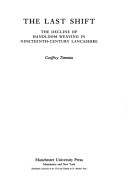A recurring theme in the literature on early and mid-19th century economic history is that, for the most part, British industrialization was achieved with relatively low levels of technology. The theme has become commonplace in general accounts of the Industrial Revolution era, stress being laid on the finding that, at mid-century, steam-powered mechanization was confined to only a few economic sectors and that relatively small numbers were employed in factory industry. It is a theme of much interest to those taking an international perspective on industrial development and has been seen to have implications for Britain's relative economic decline in the late 19th century and beyond. Essentially, its proponents have sought to correct an over emphasis on the degree of technological advance achieved during Britain's Industrial Revolution. Prominent amongst recent contributors to the theme is N.F.R.Crafts. In his major re-assessment of the nature and course of British industrialization, he highlights the low levels of productivity associated with the persistence of traditional manufacturing activity. Much of British manufacturing remained traditional.
As late as 1841, no more than one in five workers could be counted amongst those in "revolutionized industry". In few parts of the country would this figure have reached 30%, whilst in most of southern England it would have been well under 10%. Even in Lancashire and the West Riding, probably the most advanced industrial areas, figures of under 40% would have applied. The extent of structural change in the British economy was far more advanced than in the rest of Europe, but much industrial activity remained small-scale being little affected by the use of steam power.
- ISBN10 0719037255
- ISBN13 9780719037252
- Publish Date 18 March 1993
- Publish Status Out of Print
- Out of Print 24 May 1996
- Publish Country GB
- Imprint Manchester University Press
- Format Hardcover
- Pages 256
- Language English
